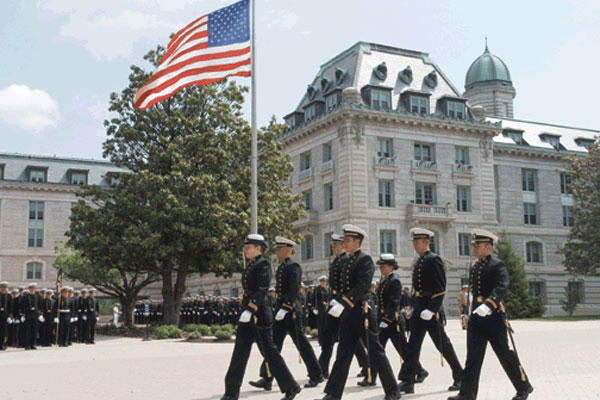A female midshipman testified Thursday that she waited five months before swearing to the military equivalent of rape charges against three Navy football players out of shame and concern that going public would hurt her Navy career.
In an aggressive cross-examination, a defense lawyer attacked the character of the alleged victim, seeking to portray her as a habitual liar and abuser of alcohol who regularly broke Naval Academy rules.
The dramatic confrontation in a Washington, D.C., Navy Yard courtroom occurred at an Article 32 hearing, the military version of a grand jury proceeding, to determine whether there was sufficient evidence to order a general court martial against Midshipmen Eric Graham, of Eight Mile,Ala., Tra'ves Bush, of Johnston, S.C., and Josh Tate, of Nashville, Tenn.
The three were members of the varsity football team at Annapolis and each faces the possibility of more than 30 years in jail if convicted at a court martial on charges of aggravated sexual assault under Article 120 of the Uniform Code of Military Justice and making false statements under Article 107.
Under questioning from Cmdr. Philip Hamon, representing the Navy, the 21-year-old alleged victim calmly related how she downed shots of rum with a male midshipman friend in her dormitory room before going to a "Yogas and Togas" all-night party at an off-campus location in Annapolis widely known as the "football house," where she continued drinking.
The woman, now a senior, said she passed out at the party and learned later from friends and social media that the three defendants were bragging about having sex with her.
She repeatedly said "I can't remember" or "I don’t remember" having sex with the three defendants at the party, but acknowledged that there was a fourth football player present when she woke up at the party House. She said the player helped find her shoes and then had consensual sex with her before she returned to the Academy.
Her demeanor on the stand broke only once, as she dabbed at her eyes with a napkin when Hamon questioned her on the long delay between the alleged crimes and her swearing to charges.
"I was, mainly, I was scared," the alleged victim said. "I just didn't have courage. I didn't want my Mom to find out," she said, and she was also concerned that making serious charges against football players might get her expelled from the Academy or ruin her career in the Navy.
While on the stand, she appeared to avoid looking at the three defendants, taking a brief glance at Midshipman Bush only when a defense lawyer had referred to him. The three defendants sat almost at attention, their facial expressions unreadable and their eyes rarely straying from the witness stand.
Although she could not recall having sex with Midshipman Bush at the party house, the alleged victim admitted to an earlier relationship with him. "We had sex on multiple occasions," she said of Bush. "We had ended things. I would've never called him my boyfriend."
She said she eventually came forward after another female midshipman she knew from Bible class pressed her "to come clean," but initially she didn't want what she termed "negative attention."
Instead, the alleged victim said she agreed to accept punishment from the Academy for drinking. Part of the punishment was her promise to stop drinking for six months, but she admitted to breaking the no-drinking pledge repeatedly and lying about it to superiors.
On cross-examination, civilian lawyer Andrew Weinstein repeatedly attacked the alleged victim's credibility. She said that everybody lies on occasion but that she doesn't lie very often and didn't remember lying about anything important.
Earlier, the Article 32 hearing frequently went into lengthy closed sessions as lawyers for both sides and Cmdr. Robert P. Monahan, Jr., who is presiding as the investigating officer for the proceeding, argued over the admissibility into evidence of the alleged victim's medical records and sexual history.
Outside the courtroom, Susan Burke, the Annapolis lawyer representing the alleged victim, said the victim's medical records had nothing to do with the case. Burke said she and her client agreed that the defense should have medical records from April 2012, when the alleged offenses occurred, but all other records were irrelevant.
Burke also argued that military sexual assault cases should be taken out of the chain of command. "The structure of the military law system is flawed," said Burke, who supports a bill offered by Sen. Kirsten Gillibrand, D-N.Y., that would strip commanders of their current authority over sexual assault cases and give that authority to independent prosecutors.
The hearing was expected to last at least through Friday, with a number of current football players expected to testify for the defendants. The defense was also expected to raise the issue of command influence in the case.
The Naval Academy Superintendent, Vice Adm. Michael H. Miller, referred the charges to the Article 32 hearing in June, three weeks after President Obama condemned sexual assaults in the military in his May 24 commencement address at Annapolis.





























